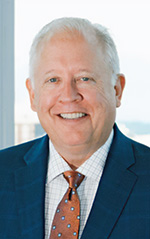Liberate the Future
Today’s diplomats have an opportunity to play a historic role in reshaping the direction of U.S. foreign policy.
BY THOMAS A. SHANNON JR.
Few generations of American diplomats are given the privilege and opportunity to reshape the direction of our great republic’s foreign policy. Fewer still are asked to undertake such a task during a period of domestic political ferment and change.
Today’s diplomats, both U.S. Foreign and Civil Service, find themselves in the extraordinary position to play such a historic role—with, however, an added twist. This generation is also being asked to find a way to make government work, and protect America’s fundamental national security interests, during a period of intense political strife, polarization, partisanship, and institutional decay. The professional career officers who make up our national security agencies face an additional and ironic challenge. Their work, which has been denigrated by political leaders and elected officials over time, is now viewed as part of the problem and something that needs profound reform.
The challenges facing our career services are compounded by political rhetoric that presents the United States as approaching an existential crossroads and portrays political adversaries as enemies. Fear now has political currency. And the nonpartisan nature of our career bureaucracy seems quaint. In such a heated environment, it is easy to point fingers at transgressing political figures, as if their disappearance or defeat would somehow allow everything to return to normal.
But the real task—our opportunity!—is far greater. We need to clearly understand the new world in which we now live. We need to recognize the forces of transformational change at work in our world, and step away from ideologies and rhetoric that limit our understanding of this new world. Henry Kissinger once wrote that great diplomats will be “judged in the end not by their cleverness but by their grasp of reality.” He urged Americans to be “pitiless” in judging our current circumstances.
As we advance from such knowledge to action, it is worth reflecting on the words of Niccolo Machiavelli, the statesman and philosopher, who wrote: “It ought to be remembered that there is nothing more difficult to take in hand, more perilous to conduct, or more uncertain in its success, than to take the lead in the introduction of a new order of things.”
The Meaning of the Moment
Our current circumstance is not of recent vintage. It has been building over time, driven by rapid economic and social changes that have transformed the communities and country in which we live. Our political leaders, parties, and institutions have not been able to grasp, understand, explain, or respond comprehensively to these changes. This has left the American people increasingly desperate, as they move from leader to leader, party to party, looking for someone to make sense of their world and guide the United States deeper into the 21st century.
The American people are not fools. They have been quietly conversing among themselves about the purpose of American power in the world. This debate, which once revolved around American power and principle, now revolves around American grievance. Thirty-five years after the end of the Cold War, are the American people wrong to ask why our global security commitments have expanded and not contracted? Are they wrong to ask why our allies, including neighbors like Canada, avoid shouldering a heavier military and security role? Are they wrong to ask why the global economy we constructed has exacted such a painful cost in communities built on industry and unionized labor? Are they wrong to ask why successive governments and Congresses have allowed our migration policy to be defined by informality and illegality? Are they wrong to ask why our extraordinary wealth never seems to reach those who most need it?
There are answers to all these questions, but our political leadership is not responding to them. Worse, the national security elites of both parties talk only among themselves. This growing divide between the American people and U.S. foreign policy is evident in polling data and voting. No amount of ideological rhetoric will close this gap. The world needs to be explained anew.
We require a professional mindset that allows us to operate within our current environment without being sucked into the partisan vortex.
To our adversaries, this foreign-policy disconnect is puzzling and opens an opportunity they will seek to exploit. To our allies and partners, it is distressing. Both see the United States as an enormously powerful country with a remarkably flexible and responsive political system. Both see our economy as endlessly inventive, something that seems to produce jobs and wealth at will. Both envy our innovation ecosystem and recognize our leadership in science and high technology. Both understand that we are an increasingly diverse and varied society that is not only cosmopolitan but global. In short, they both understand us as the premier global power that will not be easily shuffled off the world’s stage.
In such a complicated and dangerous environment, with so many crosscurrents, how is today’s generation of American diplomats and national security professionals to navigate the ship of state?
A Professional Mindset
Political polarization is like water. It knows no natural limits. Those limits have to be constructed. We have institutional and legal constraints to prevent partisan political activity within the career bureaucracy. But in a polarized society that peddles fear of the adversary, formal constraints are not enough. We require a professional mindset that allows us to operate within our current environment without being sucked into the partisan vortex. In other words, we cannot lose our nerve, and we must never lose our respect for the choice of the American voter.
We all swear (or affirm) an oath of allegiance to the Constitution of our republic. It is commonplace to remind all being sworn in that they are making an oath not to a leader, a people, or a bloodline, but to our Constitution and the values that it carries. Implicit in this oath is a recognition that the American people are our ultimate sovereign. Through this oath, we recognize the authority of the elected leaders chosen by the American people as their representatives. It is our purpose to work with these elected leaders to enact their policies and programs.
We are a disciplined service. But obedience does not mean obsequiousness. It is our purpose to provide the best analysis and advice that we can to our elected and appointed leaders. But it is also our responsibility to let these leaders know when they are mistaken or have taken decisions that will harm our interests or contravene our values.
Constructive dissent is an honored practice within the State Department. There are formal processes and procedures to register such dissent. By its nature, such dissent is a negative process. It represents disagreement with policy decisions, and it is usually expressed at the end of a decision-making process. It is valuable as a reminder of when a decision went wrong or as an opportunity for dissenting officers to speak their mind. But that is not enough.
Positive Engagement
What our leaders and our institutions need most is the daily willingness to speak with clarity and integrity about the issues facing policymakers. This can be most powerful in moments when decisions are being made, but it is also needed in the analysis and reporting that constitutes much of our work. In a dynamic world defined by complexity, conflict, and contestation, the ability to describe events and issues, place them within a strategic context, and suggest courses of action that will lead to success is what makes our career services valuable to presidents and their governments.
Such positive engagement with elected and appointed leaders will help them have the kind of conversation about foreign policy with the American people that is so lacking. In so doing, our career services will have to step away from the shibboleths that have defined American foreign policy since the end of the Cold War, and to think about the world in fresh ways.
What has defined American power is not our destructive capability but our constructive purpose.
The nature of American leadership, global purpose, and reliability as a partner are all being questioned. The so-called Global South does not accept our narrative of an international struggle between democracy and authoritarianism. Increasingly, our relevance to other countries depends not on ideology but on our ability to help them succeed. As we navigate in this changed world, it will fall to our career services to liberate the future from a past that has run its course.
The world’s security challenges are not subject to American elections. These challenges do not change just because there is a new occupant in the White House. Some of these challenges reflect contests deeply rooted in regional rivalries or expressions of ambition long desired. But much in our world is malleable and can be shaped by active diplomacy that understands the world correctly.
Understanding Today’s World
In this regard, I would suggest the following propositions to refresh how we think about the world in which we live, work, judge, and act.
First, our enemy is the status quo. We have many adversaries. Some will remain fixed over time; others will come and go. However, our enemy is the tendency to try to preserve our global position by freezing our advantages and our opponents’ weaknesses in time. This will not work. The United States has never been a status quo country. Our purpose was never to restore a past or preserve a present. It has always been about projecting ourselves into the future. When we have fought, it has always been about shaping the future. Abraham Lincoln said during the Civil War that we fight for a “vast posterity.” That is still true.
Second, all politics are social. The biggest challenges facing government and the politics that underpin it will be inequality, contingency, and discontinuity. During a century of unprecedented wealth creation and technological advancement, there will be a relentless demand for access to the education, health care, security, and resources that people believe will allow them to define and determine their individual destinies. Today, migration is the most dramatic expression of this reality.
Third, values matter. Power is an empty concept. Absent the purpose that values give to it, power is unsustainable over time. What has defined American power is not our destructive capability but our constructive purpose. Democracy is not just a form of government or the expression of a constitutional or institutional arrangement; it is also a fundamental moral commitment to the individual and to their right to self-expression. In other words, it is a commitment to an open society that empowers the individual. This commitment to values has given our democracy a human face and allowed us to step beyond formulated doctrines and discuss greater problems of human nature and destiny.
Fourth, societies and cultures will drive relations between and among states. States will continue to be the fundamental building blocks of the global order. However, the expression of national interest will increasingly reflect the societies and cultures that reside within and across these states. This creates a larger panorama for communication and cooperation, one that gives an advantage to our own society because of its diversity, variety, and vast communication platforms. But it will also require us to use insight, sensitivity, and empathy to better understand the world we live in.
Fifth, legitimacy will be determined by outcome. Process, such as free and fair elections and the peaceful transition of power, will remain an important cornerstone of political legitimacy. However, these processes must produce governments that can deliver results. In a world transforming itself, pleas to process will be viewed as efforts to entrench the status quo. For the purpose of American diplomacy, we must be able to show that democracy is capable of fundamentally transforming societies, but doing so peacefully and within constitutional and lawful structures.
Beyond Outdated Ways
Reflecting on these propositions will help us step beyond older and increasingly outdated ways of understanding the world. It will refresh our conversation with the American people and allow elected leaders to engage voters on issues and themes that are already part of the reality of the American public. It will also allow our career Foreign Service members to approach our elected and appointed leaders in a way in which the integrity and clarity of our voice can be heard.
In his 1969 memoir, Present at the Creation, Secretary of State Dean Acheson described the generation of American diplomats who shaped the world after World War II as filled with “daring and buoyant determination,” but also defined by “ignorance of the true situation.” He wrote that the postwar period was “one of great obscurity to those who lived through it.” And, he said, “the significance of events was shrouded in ambiguity.”
I believe that today’s American diplomats and national security professionals have the same daring and buoyant determination as Acheson and his colleagues, but we can make no claim to ignorance. Nor can we assert that the world is obscure or that the significance of events is unknown. We know what needs to be done, and we know why; and for that reason, we will be judged.
When sharing or linking to FSJ articles online, which we welcome and encourage, please be sure to cite the magazine (The Foreign Service Journal) and the month and year of publication. Please check the permissions page for further details.
Read More...
- The Foreign Service Act of 1980 (Government Printing Office)
- “Reimagining the Future of American Leadership” by Thomas A. Shannon Jr., The Foreign Service Journal, January-February 2018
- “Promoting Democracy in Tumultuous Times” by Bill Wanlund, The Foreign Service Journal, December 2022





